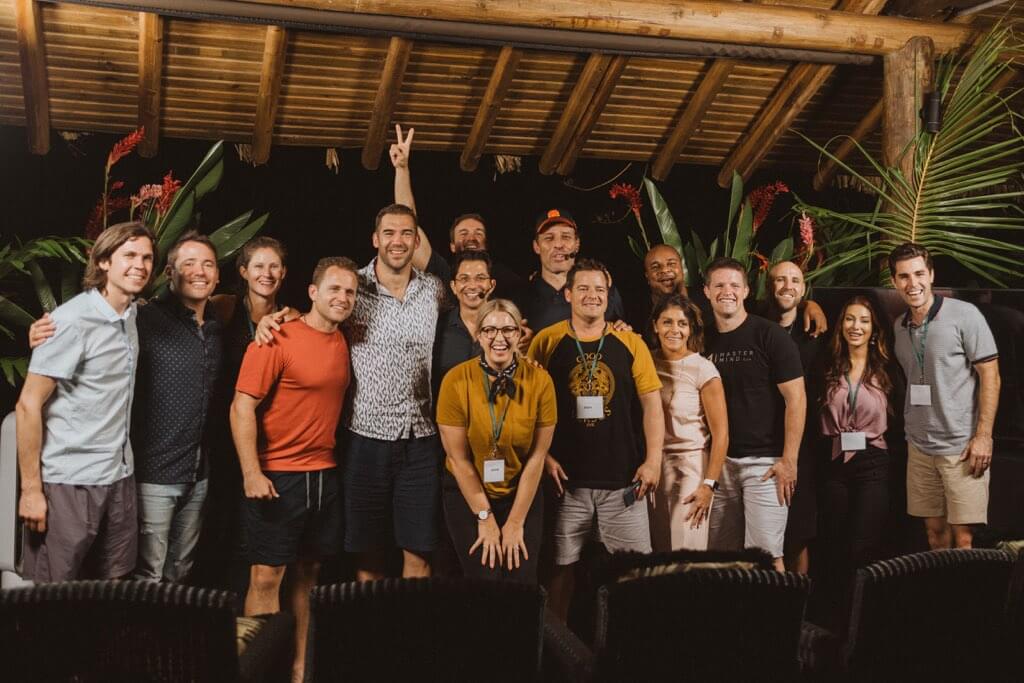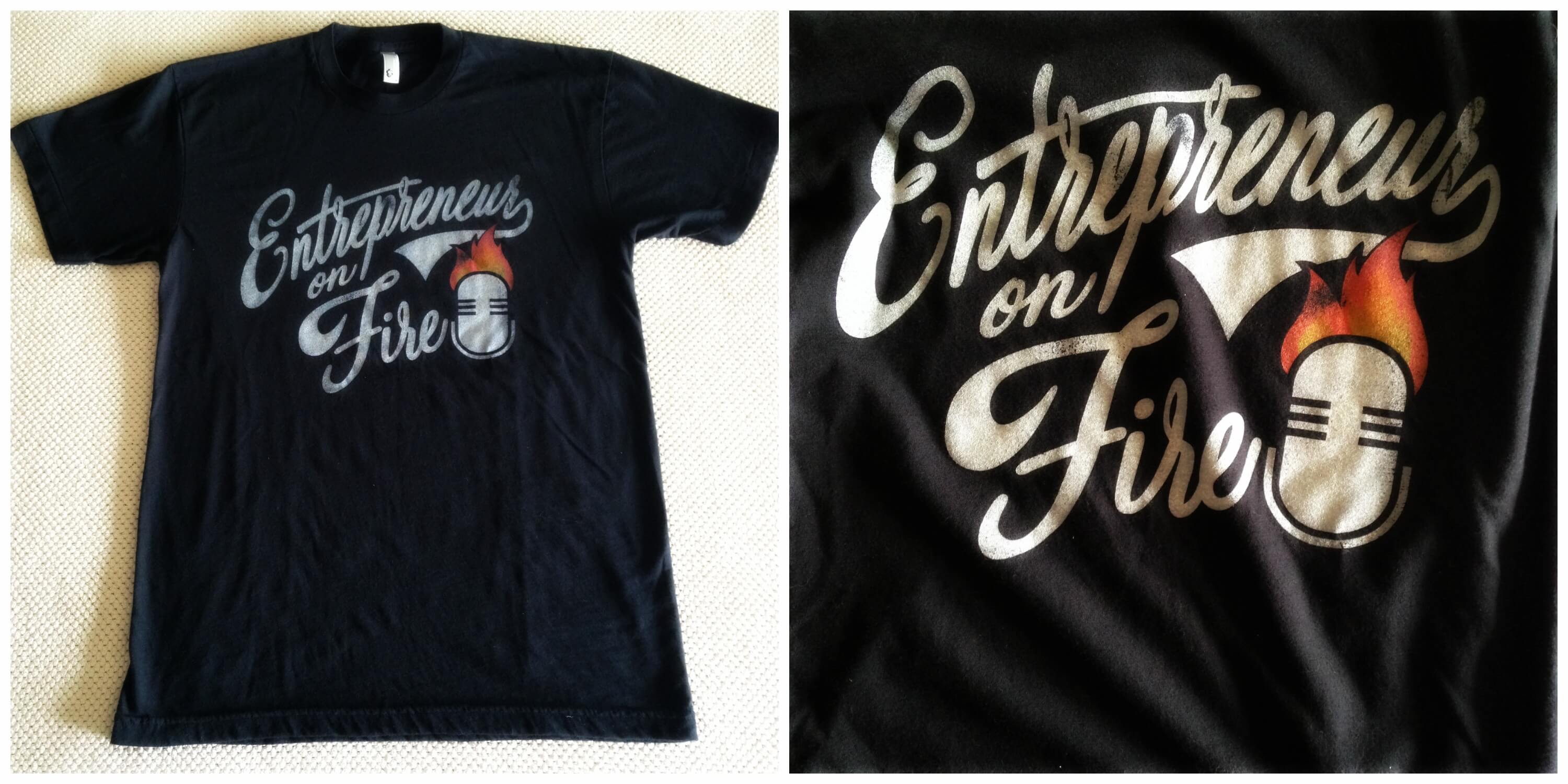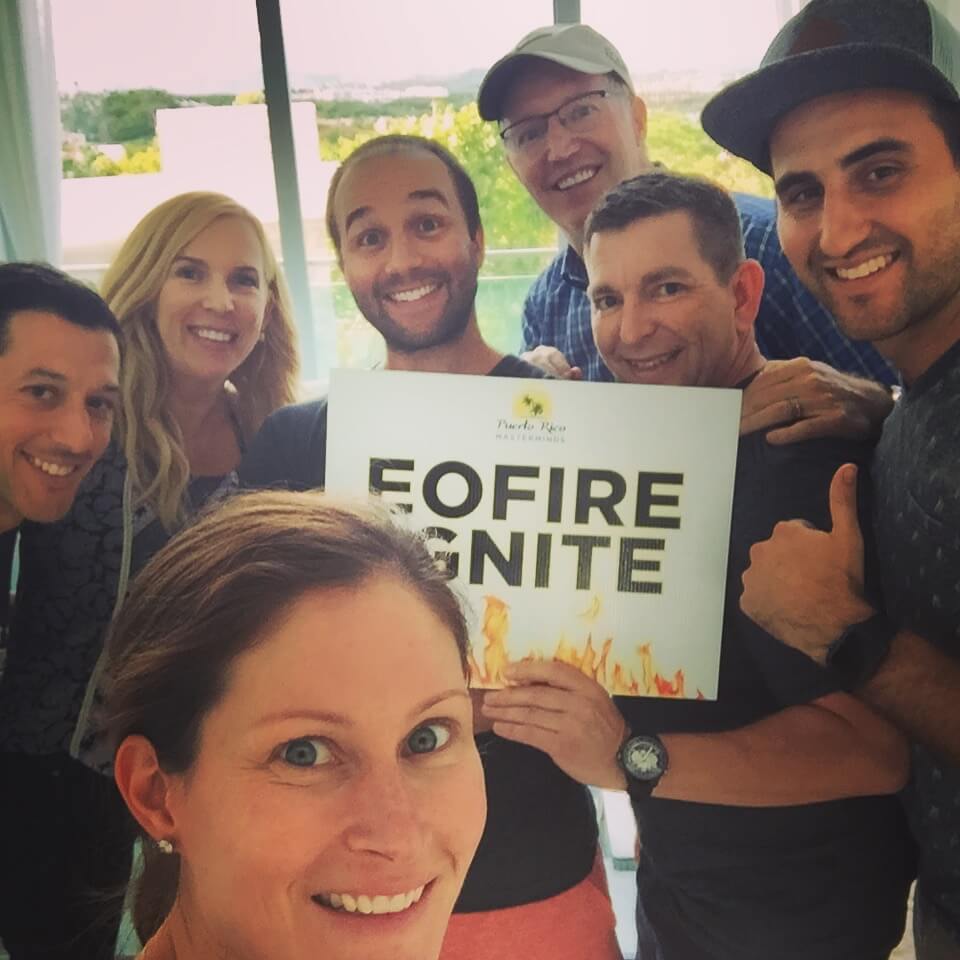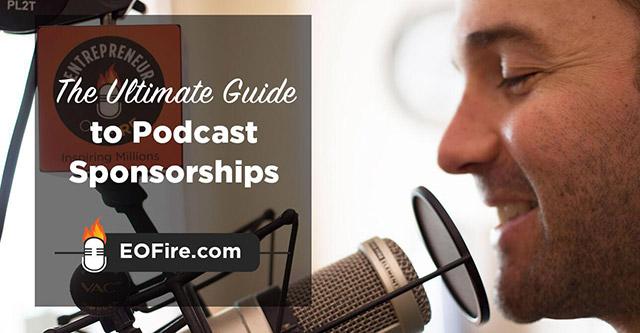It’s a question on a lot of podcasters’ minds, and on the minds of pretty much everyone they tell about their idea. How do podcasts make money?
There are actually many ways that a podcast can make money, and we’ll dive deep into several of those ways right here in this post.
First, let’s make one thing clear: if you’re starting a podcast just to make money, don’t do it.
While making money from a podcast is absolutely possible, keep in mind that successful podcasts are oftentimes a full time gig. It takes time to come up with a winning podcast idea, create valuable and consistent content, and grow an audience who knows, likes, and trusts you.
All of that also requires that you’re actually excited about your podcast idea.
That and – podcasting is a marathon. Not a sprint.
Okay, okay… but what about the money thing? Can you earn money from podcasts?
Can you earn money from podcasts?
The short answer is yes. We’ve been earning a significant amount of money from our podcast since 2013. You can read all about it in our monthly income reports, where we share every dollar spent and received.
We have four main revenue streams right now:
- Sponsorship revenue
- Affiliate relationships
- Online courses
- Physical journals
One might argue that not all of these revenue streams come directly “from the podcast”. And I would argue back that exactly zero of these revenue streams would be possible without the podcast.
Entrepreneurs On Fire launched in September 2012. John had zero online presence, no website, no entrepreneurial connections, and no broadcast experience.
Everything we’ve created in our business has been a result of the connections, relationships, and audience we’ve built from the podcast.
So if you’re wondering how to make money with podcasts, then you’re in the right place!
How much money do podcasts make?
How much you can make from a podcast is a separate story. While some podcasters are making millions of dollars per year – us included – other podcasters might earn 6-figures, 5-figures, or close to nothing from their podcast.
One of the most immediate ways to earn money from a podcast that comes to mind for most is through podcast sponsorships. Essentially, businesses and brands pay a podcast host money to get in front of their audience and advertise their products and services.
If you’re looking strictly at podcast sponsorships, then there are industry standards that share how much money you can make per episode based on the number of downloads you get.
I am going to talk more about podcast sponsorships as a revenue stream, but here is a deep dive on all things podcast sponsorships since I won’t be covering everything there is to know in this post.
How much do podcasts make per episode?
The typical CPM, or “cost per mille”, is the amount of money you’ll make based on every 1,000 downloads per episode. An easy calculation is to look at the industry standard for a midroll sponsorship, which is a $25 CPM.
Let’s say you get 5,000 downloads per podcast episode (measured at 6 weeks post-publishing).
A sponsorship would then equal $25 x 5 = $125.
Of course the more downloads, the higher your revenue will be. If you have a million downloads, then you’re looking at $25,000 per sponsor for each episode.
You can also start to factor in prerolls and postrolls, which are ad reads that come at the beginning and the end of a podcast episode. These vary when it comes to the industry standard for pricing, ranging from $10 – $18 depending on the length (typically 15 or 30 seconds).
There are several different options for podcast sponsorships beyond the CPM model, too. There is also what’s known as the CPA model: cost per acquisition. This is a great model for podcasts that are very niche and that are advertising a higher cost product or service.
Instead of looking about downloads per episode, the CPA model is only interested in conversions: you earn a set dollar amount each time someone joins the service or buys the product.
Imagine a podcast that’s all about pregnancy landing a sponsor who sells strollers that are upwards of $1,000. Even if that podcast isn’t getting tens of thousands of downloads, a CPA model given what a targeted audience they have, would be a great route.
There are also hybrid models where you’re quoting a cost based on a number of factors. For example, you might put together a podcast sponsorship package that includes email marketing, social media promotions, and website mentions, in addition to the actual podcast sponsorship.
In these cases, you would quote your sponsorships based on the value of each of these things in your business.
Top 5 Ways you can make money from podcasts
Now that you have a little background on how to make money on podcasts when it comes to sponsorships, let’s dive into the top 5 ways to make money with podcasting.
1. Online Courses
A question so many of our listeners were asking John within 6 months of him launching Entrepreneurs On Fire was “How did you start your podcast?”
In 2012 the podcasting space was still quite young, and there were very few resources available on how to start a podcast.
Since John had put in the time to learn from multiple podcasting experts, and had invested in training and coaching to get things right, he thought “why not create something to help answer these questions I’m getting on a regular basis around how to start a podcast?”
And so he did. He came up with the idea to start an online course to teach people how to Create, Grow, and Monetize their podcast: Podcasters’ Paradise.
There are endless examples and opportunities when it comes to creating online courses in every industry and niche. If you have knowledge and expertise you can share with your audience – and they are already coming to you and asking for it – creating an online course is an awesome option.
2. Masterminds
Creating a mastermind was the first major revenue stream for us here at Entrepreneurs On Fire. So many of our listeners were reaching out to John and saying how much they loved the podcast – the inspiration and motivation – but that they felt alone on their journey.
Support and surrounding yourself with likeminded people is critical on your entrepreneurial journey, and we know this. So given what so many individuals were telling us was their biggest pain point: feeling alone, we created a solution.
We launched the mastermind with 50 students, and eventually grew (and capped it) at 100. We had a private Facebook group, a website with a few resources, and that was pretty much it.
We’d meet live via what was Google Hangouts at the time (now we would be using Zoom) to do Q&A’s, help individuals get unstuck, and provide feedback and recommendations to those who needed it.
We were in the private Facebook group every single day providing support – and so were every one of our members.
Your mastermind might not look like what I’ve just described, but connection, support, and feeling like you’re part of a tribe is in our human nature. If your audience craves this, you can be the one to provide it to them.
3. Coaching
Whether it’s one-on-one or group coaching, this is another great option for monetizing your podcast if you have expertise in your industry or niche.
If you have listeners coming to you and asking you questions about your podcast topic, then start to keep a running list of the most frequently asked questions.
Look for patterns and repetition in the questions, the struggles, and the pain points your listeners are experiencing.
Now, what type of coaching can you provide to help them move forward?
While coaching programs definitely vary in pricing and structure, it’s important that you consider what type of coaching program you want to run. If you don’t enjoy having one-on-one coaching meetings on your calendar every week, then you should consider what a group program might look like.
Or perhaps coaching isn’t for you at all. Always put yourself in the position of what it will be like and consider whether any given revenue stream is right for you.
4. Sponsorships
As I laid out above, sponsorships are a popular and well-known revenue stream for podcasting. Businesses and brands are paying big money to get in front of the right listeners, and that’s why knowing your audience intimately is so important. When you’re able to communicate exactly who it is you’re speaking to, advertisers will listen.
But the question of “how to do podcast advertising” remains.
For a full breakdown, be sure to visit our ultimate guide on all things podcast sponsorships.
Right now, I’ll say this: sponsorships should always be a win/win/win:
- A win for your audience (the product or service being advertised is highly relevant)
- A win for your sponsor (because they’re a perfect fit, their ROI will show it)
- A win for you (sponsorships aren’t for everyone)
Always remember, this is YOUR show, and you get to call the shots. If you find a sponsor who doesn’t want to agree to your terms, or who approaches you to promote something that isn’t in line with your values, say no. It’s really that simple.
Again, the different models to consider for podcast sponsorships – if you do decide to go this route – are:
- CPM (per mille) – that’s per 1,000 downloads
- CPA (per acquisition) – that’s per sale
- Mix – this is your own package that combines multiple placements outside of just the ad read
5. Affiliate Relationships
A lot of people aren’t leveraging affiliate relationships because they simply don’t know how they work.
Affiliate relationships can be incredibly fruitful – if they’re the right partnerships. One of our recent affiliate launches was with Dean Graziosi and Tony Robbins for their Knowledge Broker Blueprint course, and as a result of that launch, we won a mastermind with Tony Robbins at his resort in Fiji.

Just as you would with a sponsor, researching affiliates means looking for products and services you are already using and recommending – or that you know would benefit your audience.
Once you’ve identified a product or service that you’d like to be an affiliate for, all you have to do is reach out to the individual or company who owns it and ask if they have an affiliate program.
You might be an affiliate for the tools and software you use regularly, or you might be an affiliate for an online course or product that you love. Coaching and masterminds, live events, and even platforms are a possibility.
Think Amazon. Anyone can become an Amazon Associate – you simply have to apply. Once approved, you can share your affiliate link for any product on Amazon.
The Audible Affiliate program is another great one for podcasters. Podcast listeners love audio, so what better service to promote than audio books and audio content?
Amazon and Audible are examples of affiliate opportunities that you can start literally today. But some other affiliate relationships take time. For example, if you’re looking to promote someone’s upcoming course launch, then you’ll want to get on their radar. Start building an actual relationship with them if you don’t have one already.
Always confirm the products and services you’re recommending via affiliate links are relevant for your audience, and be sure to follow FTC guidelines!
Other ways to make money from podcasting
We’ve discussed several ways you can generate revenue from your podcasting business, but there are even more ways depending on what your podcast topic is and what your listeners want and need.
Every revenue stream we’ve ever created from our podcast has been a direct result of listening to our audience’s biggest pain points and struggles.
Here’s the flow:
- We create valuable, consistent, free content via the podcast.
- We engage with our listeners.
- We learn about their biggest pain points and struggles.
- We create solutions in the form of products, services, and communities.
With this in mind, you can imagine there are endless opportunities to earn money. It’s about understanding your audience.
Donations
Many shows earn money purely from donations, and there are a lot of great platforms to help people quickly and easily set up recurring donations for shows they love.
One of those platforms is called Patreon, and it’s a platform that simply helps your people show their appreciation for your podcast via monetary donations of all sizes.
We have a deep dive on whether using Patreon is a good idea (and how to do it), so be sure to check that out for more details.
Swag
People love swag, and there are definitely ways you can create this quickly and easily for your show!
But beware: unless you go super mainstream and have hundreds of thousands of people buying your swag, it’s unlikely this will actually be a significant revenue stream for you.
Sites like Shutterfly, Zazzle, and Custom Ink are places you can go to create custom swag. We’ve done t-shirts, coffee mugs, and stickers – but the options truly seem endless!

While swag might not make you much money, it can be a great way to engage and love on the people who love your show.
You can also make it super fun! Maybe you run a promo where anyone who shares your podcast on social media and sends you a screenshot gets a coffee mug or t-shirt!
Swag is also a popular way to say “thank you” to your podcast guests.
And if you’re looking to create something custom on your own, and then bring it to a warehouse to sell on Amazon or Shopify, definitely check out the company Prouduct. They are the ones who helped us created, ship, and house all 3 of our physical journals: The Freedom Journal, The Mastery Journal, and The Podcast Journal. And they are AWESOME!
Events and Workshops
While not many podcasters think of events and workshops as a way to get paid, they can be incredibly beneficial – not just monetarily, but also in terms of growing your reach, audience, and further growing your relationship with your listeners.
An event or workshop doesn’t have to be in person. It also doesn’t have to have hundreds of people in attendance to be a success.
Think outside of the box!
You can host a virtual event or workshop that is just 1 day. Make the outcome super specific and something that would be a huge win for your audience, and chances are you’ll get several people who are interested.
In terms of marketing it, be sure you’re talking about it on your show well in advance!
If you’re thinking about hosting a 1-day virtual workshop, start talking about it on every one of your episodes two to three months ahead of time. Have a signup page for those who are interested, and a sales page for those who are ready to commit now.
Be your own sponsor!
We’ve hosted several in-person masterminds here in Puerto Rico, and they’ve not only been incredibly FUN, but the progress and support we’re able to provide has been next level!

We’ve also hosted a podcasting cruise! This was an event we’ll never forget. The time we were able to spend hanging out and enjoying the Caribbean – in addition to the time we spent learning and supporting one another on our podcasting journey can’t be replaced.
How podcasts make money
Hopefully these ideas have you thinking about the many ways you can generate revenue from your podcast. And now that you know it’s possible, it’s time to START.
When creating your podcast, don’t focus on the revenue – focus on the content, the value, and your listeners. Focus on what you want your show to become, and commit to working hard every single day in order to achieve that.
If you can build a strong foundation for your show, and consistently create free, valuable content that helps solve your listeners biggest pain points and struggles, you will win.
Remember to listen to your audience. What questions, pain points, and struggles do they come to you for? Engagement is key, and as a baseline you should be having at least 10 one-on-one conversations with your listeners per month.
Listen to the language they use, the struggles they share, and listen for repetition. Then figure out how you’re going to create the solution.

